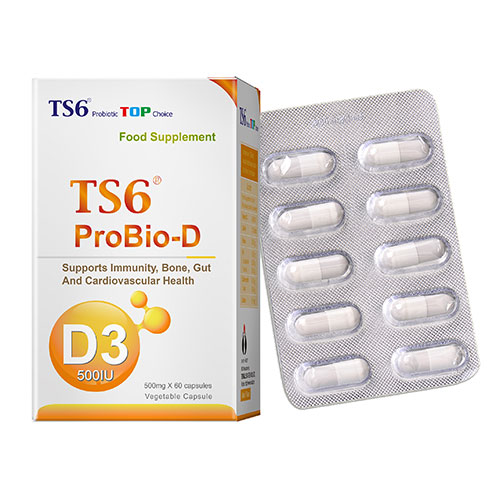
What is vitamin D?
It is one of the important nutrients fat-soluble vitamins that maintain the normal growth and health of the human body. The human body can obtain vitamin D3 from food, or from ultraviolet rays contracting with the skin to synthesize vitamin D3 from cholesterol by itself.
What are the functions of vitamin D?
Vitamin D has multiple effects on the body,
- Promote the absorption of calcium in the small intestine
- Maintain the balance of calcium, phosphorus and bone health
- Improve muscle strength
- Anti-inflammatory
- Anti-cancer
- Protect the cardiovascular system
- Enhance the body's immune cell function
What foods contain vitamin D?
Vitamin D can be obtained from the diet, and fatty fish, such as salmon, mackerel, and tuna, naturally contain significant amounts of vitamin D. Other foods, such as organ liver, egg yolks, cheese, etc., can also help supplement vitamin D. In addition, if you are a vegetarian, you can eat more mushrooms, which are rich in vitamin D.
What if people lack vitamin D?
The following symptoms may have as below:
- Decreased bone density and fragility: The body needs vitamin D to absorb calcium, helping the small intestine absorb calcium, maintaining the balance of calcium in the blood, and thus promoting bone calcification.
- Frequent illness or infections: Vitamin D plays an important role in the immune system, so people who are deficient in vitamin D are prone to weakness and illness.
- Skin problems: Vitamin D can promote skin metabolism. A lack of vitamin D can easily cause dry skin, and psoriasis.
- Joint, bone or muscle pain: Vitamin D supports muscle function and promotes protein synthesis to prevent muscle loss. Common muscle aches and pains are often the symptoms of vitamin D deficiency.
- Cardiovascular diseases: Studies have found that people who are deficient in vitamin D have a higher chance of stroke and heart disease, and an increased risk of death from cardiovascular disease, because vitamin D can reduce inflammation of the inner walls of blood vessels and help them dilate.
- Depression and bad mood: Vitamin D will regulate the balance of serotonin, and a lack of vitamin D will cause the body to lack serotonin, making it easy to feel depressed and in a bad mood. In autumn and winter, people are more likely to feel bad. It may be due to the lack of sunlight, which leads to a lack of vitamin D in the body and leads to depression.
- Get tired easily
Who needs to supplement vitamin D?
Most people work indoors and have limited access to the sun, so they are often deficient in vitamin D. Especially the elderly, those with darker skin, those with insufficient sun exposure, those with poor gastrointestinal function, patients with orthopedic diseases, etc., should pay more attention to their vitamin D intake.
Recommend TS6 ProBio-D to you!
Parents always look for natural alternatives to comfort and heal their children from cold and flu. Adopting hygiene practices and boosting the immune system is an effective way to prevent influenza. The TS6 ProBio-D contains functional formulas for flu prevention.
- Probiotics: There is a saying that the intestine is the greatest immune organ in the body. Constant consumption of probiotics can tonic the body's constitution and reinforce the intestine tract against infections including viruses.
- Perilla leaf extract: Perilla is commonly used in Chinese medicine against poison, vomit, flu, cold, fever, and flatulence. Research indicates that perilla is good for patients with inflammation, allergy, or immune disease.
- Vitamin D3: Vitamin D3 is important for calcium, phosphorus, and bone metabolism. We discuss the benefits of taking enough vitamin D3 in the above. To summarize, It can activate the physiology of cells' functions including maintaining and regulating immunity, enhancing resistance, regulating not only organs, but blood vessels, and improving endocrine function.
Contact us now for your business need.



 Home
Home











